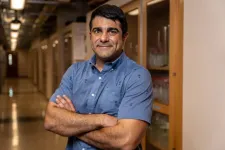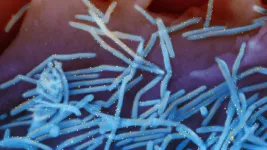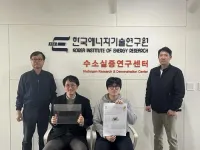(Press-News.org) A Medical University of South Carolina Hollings Cancer Center researcher is exploring new ways to improve treatment options for kidney cancer patients. With funding from a Department of Defense (DOD) Academy of Kidney Cancer Investigators Early Career Scholar Award, Aguirre de Cubas, Ph.D., will investigate how the immune system can be boosted to detect and kill kidney tumors. Congress established the award in 2017 to support research with high potential impact and exceptional scientific merit. De Cubas’ approach focuses on reactivating the immune system to recognize and target cancer cells better, offering new possibilities for improving existing therapies.
De Cubas studies renal cell carcinoma, the most common type of kidney cancer, which is often diagnosed at an advanced stage with poor prognosis. At diagnosis, 30% of patients have metastatic disease with a 5-year survival rate of only 12%. Immune checkpoint inhibitors have been a game-changer in cancer treatment, working by “removing the brakes” from the immune system to help it attack tumors. Unfortunately, response rates remain modest, with only about 1 in 5 patients with metastatic renal cell carcinoma experiencing lasting improvements.
To improve the detection of cancer cells by the immune system, de Cubas uses an innovative tool: mitochondrial DNA, or the genetic material inside the tiny powerhouses of our cells. When mitochondria are damaged, they can release DNA fragments into the cytoplasm in a way that is reminiscent of viral infection, alerting the immune system to danger. In many cancers, however, this alert system is disabled, leaving tumors undetected.
De Cubas uses strategies that mimic viral infection and trigger an immune response in cancer cells. One of these strategies involves targeting a BCL-XL protein to damage mitochondria, releasing mitochondrial DNA fragments that bring the alert system back online. His work aims to combine strategies activating viral mimicry with immune checkpoint inhibitors, making tumors more visible to the immune system and less resistant to treatment.
“Our ultimate goal is to develop a combination therapy that makes tumors more visible to the immune system while also removing its brakes so it can effectively attack the cancer,” he explained.
De Cubas credits the South Carolina Disparities Research Center (SC CADRE), a 13-year National Cancer Institute-funded partnership between MUSC Hollings Cancer Center and South Carolina State University (SCSU), a historically Black college/university, with helping him launch his research career and gather the preliminary data he needed to compete successfully for the DOD funding.
SC CADRE is co-directed by Marvella Ford, Ph.D., Endowed Chair, Cancer Disparities and associate director of Population Science and Community Outreach & Engagement at Hollings, and Judith Salley-Guydon, Ph.D., chair of the Department of Biological and Physical Sciences at SCSU. It aims to create a diverse future generation of cancer researchers specially trained to improve cancer health outcomes for South Carolinians by supporting emerging researchers like de Cubas.
“SC CADRE helped to bridge the beginning of my research ideas to a more mature concept,” de Cubas explained. “The program allowed me to develop new directions, collaborate with others and ultimately secure the funding to advance my work.”
De Cubas’ DOD award, which will enable him to establish his own independent laboratory, exemplifies the power of partnership in advancing cancer treatment and awareness. By connecting research expertise with community-focused initiatives, SC CADRE is shaping the future of cancer treatment and creating opportunities for a diverse generation of scientists.
# # #
About MUSC Hollings Cancer Center
MUSC Hollings Cancer Center is South Carolina’s only National Cancer Institute-designated cancer center with the largest academic-based cancer research program in the state. With more than 150 faculty cancer scientists and 20 academic departments, it has an annual research funding portfolio of more than $50 million and sponsors more than 200 clinical trials across the state. Hollings offers state-of-the-art cancer screenings, diagnostic capabilities, therapies and surgical techniques within its multidisciplinary clinics to provide the full range of cancer care. Dedicated to preventing and reducing the cancer burden statewide, the Hollings Office of Community Outreach and Engagement works with community organizations to bring cancer education and prevention information to affected populations. For more information, visit hollingscancercenter.musc.edu.
END
Improving immunotherapies for kidney cancer
Medical University of South Carolina Hollings Cancer Center researcher receives Department of Defense Early Career Scholar Award to improve immune therapies by targeting resistant kidney tumors.
2024-12-30
ELSE PRESS RELEASES FROM THIS DATE:
Billing patients for portal messages could decrease message volume and ease physician workload
2024-12-30
Embargoed for release until 5:00 p.m. ET on Monday 30 December 2024
@Annalsofim
Below please find summaries of new articles that will be published in the next issue of Annals of Internal Medicine. The summaries are not intended to substitute for the full articles as a source of information. This information is under strict embargo and by taking it into possession, media representatives are committing to the terms of the embargo not only on their own behalf, ...
Study of Sherpas highlights key role of kidneys in acclimatization to high altitudes
2024-12-30
(Calgary) — A study from a Mount Royal University physiologist and his team demonstrates the key role of the kidneys in acclimatization to high altitude, and illustrates another way that Sherpas are better adapted to high altitude ascent.
Results from the study were recently published in in the prestigious international science journal Proceedings of the National Academy of Sciences.
The paper, “Comparing integrative ventilatory and renal acid-base acclimatization in lowlanders and Tibetan highlanders during ascent to 4,300 m”, describes findings ...
Smartphone app can help reduce opioid use and keep patients in treatment, UT Health San Antonio study shows
2024-12-30
SAN ANTONIO, Dec. 30, 2024 – Patients with opioid use disorder can reduce their days of opioid use and stay in treatment longer when using a smartphone app as supportive therapy in combination with medication, a new study by The University of Texas Health Science Center at San Antonio (UT Health San Antonio) shows.
The cohort study of 600 underserved patients found that those who chose to use the app – which combines contingency management behavioral therapy and recovery support from peers – and alongside medication, reduced their days of opioid use by 35% compared with ...
Improved health care value cannot be achieved by hospital mergers and acquisitions alone
2024-12-30
Key Takeaways
A new study finds little evidence that hospital mergers and acquisitions reduce costs or improve quality of care.
More strategic quality improvement efforts are needed for patients to benefit from health care integration.
CHICAGO (December 30, 2024) — Mergers and acquisitions of U.S. hospitals and health systems rarely improve the quality of care delivered or result in lower health care costs and prices, according to a study published in the Journal of the American College of Surgeons (JACS).
The study, a systematic review of hundreds of published ...
People who are immunocompromised may not produce enough protective antibodies against RSV after vaccination
2024-12-30
FOR IMMEDIATE RELEASE
Johns Hopkins Medicine researchers have shown that people 60 years or older with weakened immunity — primarily organ transplant recipients who take immunosuppressive medications to reduce the risk of rejection and others with immune system disorders — do not respond as strongly to vaccines against the respiratory syncytial virus (RSV) as people in the same age group with normal immune function.
The study, conducted by a research team at the Johns Hopkins Transplant Research Center, was published today in the Journal of the American ...
Does coffee prevent head and neck cancer?
2024-12-30
In a new analysis of data from more than a dozen studies, coffee and tea consumption was linked with lower risks of developing head and neck cancers, including cancers of the mouth and throat.
Cancers of the head and neck are the seventh most common forms of cancer worldwide, and rates are rising in low- and middle-income countries. Many studies have assessed whether drinking coffee or tea is associated with head and neck cancer, with inconsistent results.
To provide additional insight, investigators led by the University of Utah’s Huntsman Cancer Institute examined data from ...
AI replaces humans in identifying causes of fuel cell malfunctions
2024-12-30
Dr. Chi-Young Jung's research team from the Hydrogen Research & Demonstration Center at the Korea Institute of Energy Research (KIER) has successfully developed a method to analyze the microstructure of carbon fiber paper, a key material in hydrogen fuel cells, at a speed 100 times faster than existing methods. This was achieved by utilizing digital twin technology and artificial intelligence (AI) learning.
Carbon fiber paper is a key material in hydrogen fuel cell stacks, playing a crucial role in facilitating water discharge ...
Pitfalls of FDA-approved germline cancer predisposition tests
2024-12-30
“The FDA approval on September 29, 2023, for ‘class III de novo’ blood tests to assess hereditary cancer risk make widely available tests that may be obtained through a Direct to Consumer (DTC) path.”
BUFFALO, NY – December 30, 2024 – A new editorial was published in Oncotarget’s Volume 15 on December 24, 2024, titled “Pitfalls and perils from FDA-approved germ-line cancer predisposition tests.“
Authored by Dr. Wafik S. El-Deiry, Editor-in-Chief of Oncotarget, and Dr. Eli Y. Adashi from Brown University, the article highlights concerns about the risks ...
A rising trend of 'murderous verbs' in movies over 50 years
2024-12-30
The amount of murdering and killing in movies has increased overall over the past 50 years, according to a new study that analyzed a massive database of film dialogue.
Researchers used machine learning to search a database of subtitles from more than 160,000 English-language movies produced from 1970 to 2000. They calculated the amount of dialogue from characters using variations of the words “murder” or “kill” in each of the films.
While the total use of these “murderous verbs” varied widely from year to year, there was a clear increasing trend over the five-decade ...
Brain structure differences are associated with early use of substances among adolescents
2024-12-30
A study of nearly 10,000 adolescents funded by the National Institutes of Health (NIH) has identified distinct differences in the brain structures of those who used substances before age 15 compared to those who did not. Many of these structural brain differences appeared to exist in childhood before any substance use, suggesting they may play a role in the risk of substance use initiation later in life, in tandem with genetic, environmental, and other neurological factors.
“This adds to some emerging evidence ...
LAST 30 PRESS RELEASES:
A genetic brake that forms our muscles
CHEST announces first class of certified critical care advanced practice providers awarded CCAPP Designation
Jeonbuk National University researchers develop an innovative prussian-blue based electrode for effective and efficient cesium removal
Self-organization of cell-sized chiral rotating actin rings driven by a chiral myosin
Report: US history polarizes generations, but has potential to unite
Tiny bubbles, big breakthrough: Cracking cancer’s “fortress”
A biological material that becomes stronger when wet could replace plastics
Glacial feast: Seals caught closer to glaciers had fuller stomachs
Get the picture? High-tech, low-cost lens focuses on global consumer markets
Antimicrobial resistance in foodborne bacteria remains a public health concern in Europe
Safer batteries for storing energy at massive scale
How can you rescue a “kidnapped” robot? A new AI system helps the robot regain its sense of location in dynamic, ever-changing environments
Brainwaves of mothers and children synchronize when playing together – even in an acquired language
A holiday to better recovery
Cal Poly’s fifth Climate Solutions Now conference to take place Feb. 23-27
Mask-wearing during COVID-19 linked to reduced air pollution–triggered heart attack risk in Japan
Achieving cross-coupling reactions of fatty amide reduction radicals via iridium-photorelay catalysis and other strategies
Shorter may be sweeter: Study finds 15-second health ads can curb junk food cravings
Family relationships identified in Stone Age graves on Gotland
Effectiveness of exercise to ease osteoarthritis symptoms likely minimal and transient
Cost of copper must rise double to meet basic copper needs
A gel for wounds that won’t heal
Iron, carbon, and the art of toxic cleanup
Organic soil amendments work together to help sandy soils hold water longer, study finds
Hidden carbon in mangrove soils may play a larger role in climate regulation than previously thought
Weight-loss wonder pills prompt scrutiny of key ingredient
Nonprofit leader Diane Dodge to receive 2026 Penn Nursing Renfield Foundation Award for Global Women’s Health
Maternal smoking during pregnancy may be linked to higher blood pressure in children, NIH study finds
New Lund model aims to shorten the path to life-saving cell and gene therapies
Researchers create ultra-stretchable, liquid-repellent materials via laser ablation
[Press-News.org] Improving immunotherapies for kidney cancerMedical University of South Carolina Hollings Cancer Center researcher receives Department of Defense Early Career Scholar Award to improve immune therapies by targeting resistant kidney tumors.



